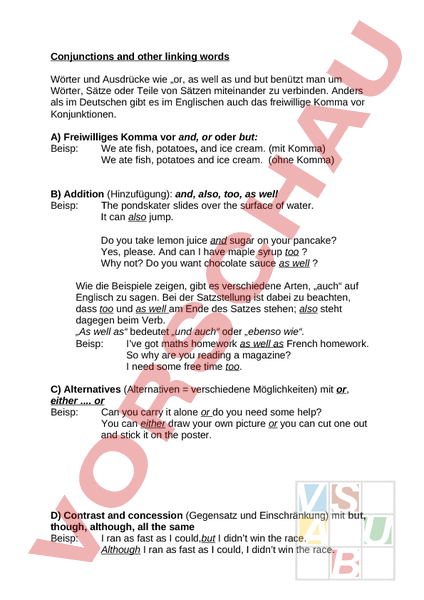Arbeitsblatt: English Conjunctions and other linking words
Material-Details
Zusammenstellung englischer Konjunktionen und anderer Verbindungswörter mit deutscher Erklärung
Englisch
Grammatik
6. Schuljahr
3 Seiten
Statistik
77486
723
3
24.02.2011
Autor/in
Marianne Drittenbass
Bergstrasse 66
8810 Horgen
8810 Horgen
044 770 15 40
Land: Schweiz
Registriert vor 2006
Textauszüge aus dem Inhalt:
Conjunctions and other linking words Wörter und Ausdrücke wie „or, as well as und but benützt man um Wörter, Sätze oder Teile von Sätzen miteinander zu verbinden. Anders als im Deutschen gibt es im Englischen auch das freiwillige Komma vor Konjunktionen. A) Freiwilliges Komma vor and, or oder but: Beisp: We ate fish, potatoes, and ice cream. (mit Komma) We ate fish, potatoes and ice cream. (ohne Komma) B) Addition (Hinzufügung): and, also, too, as well Beisp: The pondskater slides over the surface of water. It can also jump. Do you take lemon juice and sugar on your pancake? Yes, please. And can have maple syrup too Why not? Do you want chocolate sauce as well Wie die Beispiele zeigen, gibt es verschiedene Arten, „auch auf Englisch zu sagen. Bei der Satzstellung ist dabei zu beachten, dass too und as well am Ende des Satzes stehen; also steht dagegen beim Verb. „As well as bedeutet „und auch oder „ebenso wie. Beisp: Ive got maths homework as well as French homework. So why are you reading magazine? need some free time too. C) Alternatives (Alternativen verschiedene Möglichkeiten) mit or, either or Beisp: Can you carry it alone or do you need some help? You can either draw your own picture or you can cut one out and stick it on the poster. D) Contrast and concession (Gegensatz und Einschränkung) mit but, though, although, all the same Beisp: ran as fast as could,but didnt win the race. Although ran as fast as could, didnt win the race. didnt win the race although ran as fast as could. Though rabn as fast as could, didnt win the race. didnt win the race though ran as fast as could. Though und although bedeuten dasselbe. Wie im Deutschen sind zwei Satzstellungen möglich. Wenn du den Teilsatz, der mit though oder although beginnt, an den Anfang stellst, setzt du nach ihm ein Komma. Wenn du ihn dagegen ans Ende stellst, braucht es kein Komma. „All the same bedeutet trotzdem oder dennoch! Beisp: ran as fast as could. All the same, didnt win the race. Its raining. Do you want to play football all the same? E) Reason, purpose, result (Grund, Zweck, Folge) mit because, to, so, as result Beisp: Monica: have to buy some food because were going on an excursion tomorrow. Kevin: Where are you going? Monica: To Lucerne to visit the transport museum. „So kann sowohl den Zweck als auch die Folge einer Handlung bezeichnen, während „as result immer eine Folge bezeichnet. Beisp: Im going to set my alarm clock so dont wake up too late. got up too late yesterday morning and missed the train as result. F) Condition (Bedingung) mit if Beisp: If you want to go on playing, you have to stick tot he rules. If you go now, you will be on time. wouldnt do that if were you. Wenn du den Teilsatz, der mit if beginnt, an den Anfang stellst, setzt du nach ihm ein Komma. Wenn du ihn ans Ende stellst, braucht es dagegen keins. G) Time (Zeit) mit when, while, before, after Beisp: Who feed the mouse while were on holiday? In winter, its still dark when get up. Please tidy up after you finish. Before you plant seeds, you have to soak them in water. Wie bei den Sätzen mit though although und if gilt auch hier die Kommaregel: Wenn du den Teilsatz, der mit der Konjunktion beginnt, an den Anfang stellst, setzt du nach ihm ein Komma. Wenn du ihn ans Ende stellst, braucht es dagegen keins. Die Wörter „first, next, then, after that, finally zeigen dir die Reihenfolge an. Beisp: Yesterday, we decorated our classroom. First, we put lots of posters on the walls. Next, we put the desks into groups and then we placed the chairs around them. After that, we planted sunflower seeds into small pots and put them on the window sill. Finally, we put the books an the shelves in our new reading corner. H) Linking clauses with that and with question words Beisp: Did you know that some birds build their nests on the ground? Während im Deutschen vor „dass immer ein Kommas steht, steht im Englischen vor that keines! In der Umgangssprache wird that oft weggelassen! Beisp: Did you know some birds build their nests on the ground? Beisp: dont know why this happened. wonder where theyre going. Can you tell me how you made the instrument?
